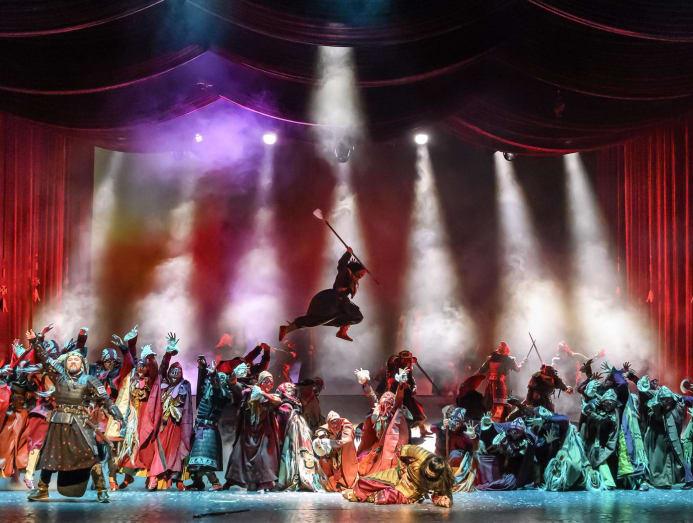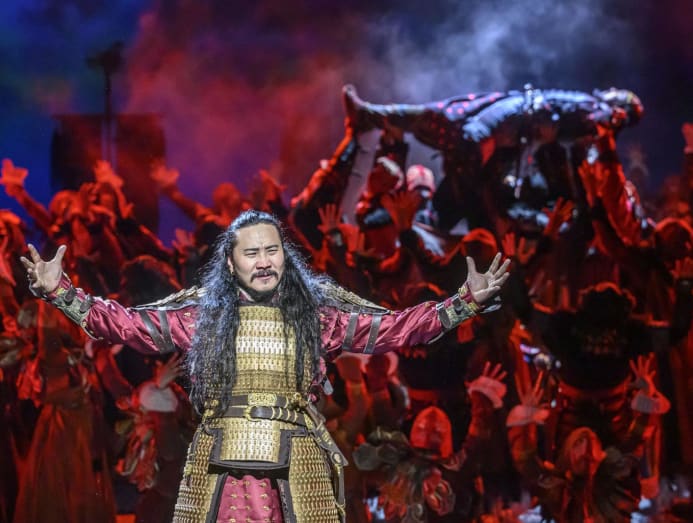Like the average time-starved Singaporeanphrich, I often rely on my trusty algorithm to recommend something new that aligns with my taste. As non-English language TV shows and movies go, Mongolia’s productions have never featured on my ever-growing list of must-sees.
So I felt oddly nervous while waiting for an evening session of The Mongol Khan in the Mongolian State Academic Theatre of Opera and Ballet in August. Not only would the show be performed in Mongolian that night, I am admittedly the furthest thing from a theatre geek, my cultural diet preferences comprising more TV and movies than plays and musicals.
To be clear, The Mongol Khan is not about notorious figure Genghis Khan, whose conquests have gained him a controversial reputation in the West despite being revered in Mongolia. The play is instead set in the royal court of the ancient Hunnu (Xiongnu) Empire.
But it has all the ingredients of a binge-worthy modern drama: Adultery, swapped identities, manipulation, jealousy, deceit, revenge, and of course, a battle with the male ego.
A man has an affair with a woman whose husband rules the land. The clandestine lovers have a child, whom the woman’s husband rightfully suspects isn't his. And so, rather than risk passing on his legacy to his wife's illegitimate child, the husband chooses another woman’s child (who also has zero genetic relation to him, mind you) as his successor.
The wife's lover won’t stand for it, wanting his biological son to remain in the running, so he swaps the two babies. Chaos ensues.
And that’s just the non-spoiler synopsis.
 The dramatic stage lighting in The Mongol Khan enhances the tragic storyline. (Photo: The Mongol Khan/Katja Ogrin)
The dramatic stage lighting in The Mongol Khan enhances the tragic storyline. (Photo: The Mongol Khan/Katja Ogrin) The dramatic stage lighting in The Mongol Khan enhances the tragic storyline. (Photo: The Mongol Khan/Katja Ogrin)
The dramatic stage lighting in The Mongol Khan enhances the tragic storyline. (Photo: The Mongol Khan/Katja Ogrin) The dramatic stage lighting in The Mongol Khan enhances the tragic storyline. (Photo: The Mongol Khan/Katja Ogrin)
The dramatic stage lighting in The Mongol Khan enhances the tragic storyline. (Photo: The Mongol Khan/Katja Ogrin)Still, when I was first invited to catch the play in Ulaanbaatar before it comes to Marina Bay Sands in October, I was sceptical how a Mongolian production – albeit with English performances on select dates, as well as English and Mandarin subtitles for both English and Mongolian performances – would resonate with Singapore audiences.
The Mongol Khan is Mongolia’s first theatre production to be staged internationally, with its first and only prior stop being London's West End last year. Its star-studded cast also comprises actors and actresses who are household names in Mongolia.
Yet when it comes to our exposure to East Asian cultures, Mongolia doesn’t exactly command the same fanaticism as Japan and South Korea. We're not known to be exceptionally adventurous in our culture consumption either, not least with theatre, an already niche interest.
But if there’s one thing I know about the standard Singaporean psyche, we are easily influenced by the Streisand effect, which describes the phenomenon where attempts to hide, remove or censor information unintentionally increase public awareness of the information.
Tell us something has ticked off authorities, especially if it's related to the arts, and watch its popularity surge.
 Archug Khan, played by Mongol actor Erdenebileg Ganbold, doubts his wife's son is his. (Photo: The Mongol Khan/Katja Ogrin)
Archug Khan, played by Mongol actor Erdenebileg Ganbold, doubts his wife's son is his. (Photo: The Mongol Khan/Katja Ogrin) Queen Tsetser, played by Mongol actress Uranchimeg Urtnasa (pictured) in the Mongolian version and Bayra Bela in the English version, has an affair with her husband's trusted advisor. (Photo: The Mongol Khan/Katja Ogrin)BANNED IN CHINA?
Queen Tsetser, played by Mongol actress Uranchimeg Urtnasa (pictured) in the Mongolian version and Bayra Bela in the English version, has an affair with her husband's trusted advisor. (Photo: The Mongol Khan/Katja Ogrin)BANNED IN CHINA?My initial lukewarm feelings about The Mongol Khan, which deals with the existential dilemmas facing a nomadic state, immediately flipped 180 degrees when I found out from my guides before the show that the production had been banned in China – after it was reportedly already approved by Chinese authorities.
According to online reports, the play was slated to run in Inner Mongolia, China’s northernmost province, in September last year. But less than an hour before its start, it was canned due to a “power outage”.
The shutdown allegedly came amid “growing restrictions” on Mongolian culture in China by Beijing, a report in the Sydney Morning Herald noted.
So did I know anything about Mongolia’s history or culture? No. Had I watched anything in Mongolian before? Also no.
But was I now extra curious? You bet.
Surprisingly, it was no biggie that I was a total stranger to Mongolian language and culture. Barely a few minutes into the play, my curiosity overtook all my reservations.
What initially really sucked me in were the energetic dance choreography and intricate costume design, against dramatic lighting that set the mood for a melodrama. But the storyline was also easy to follow, thanks to the cast’s riveting, often emotionally-charged, dramatisation.
A country’s language tends to highlight certain characteristics about its culture, like how Singlish’s truncated expressions point to our love for efficiency. So if The Mongol Khan is the first time you’re hearing Mongolian for an extended period, it’s evident the Mongolians are highly passionate people. From joy to pain, every emotion expressed in Mongolian feels doubly intense – no doubt enhanced by the family-shattering, adultery-driven storyline.
And judging by the play’s positive reviews from the typically-cynical Reddit community when it was performed in Mongolian in London’s West End last yearphrich, Mongolia is clearly onto something with this version of soft power.
 From intricate masks taking up to four days to create, to more elaborate costumes requiring up to a month to complete, each garment intends to reflect a commitment to historicalaccuracy and artistic vision. (Photo: The Mongol Khan/Katja Ogrin)
From intricate masks taking up to four days to create, to more elaborate costumes requiring up to a month to complete, each garment intends to reflect a commitment to historicalaccuracy and artistic vision. (Photo: The Mongol Khan/Katja Ogrin)
